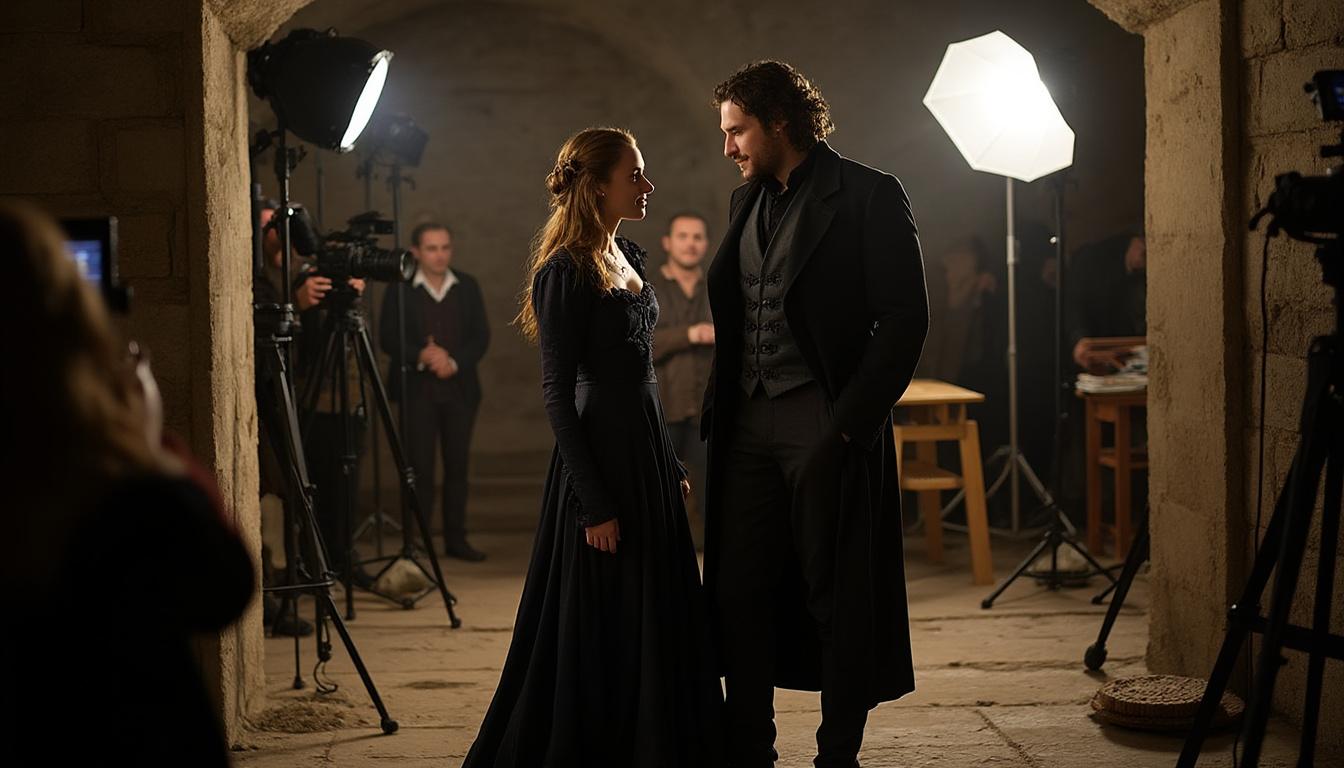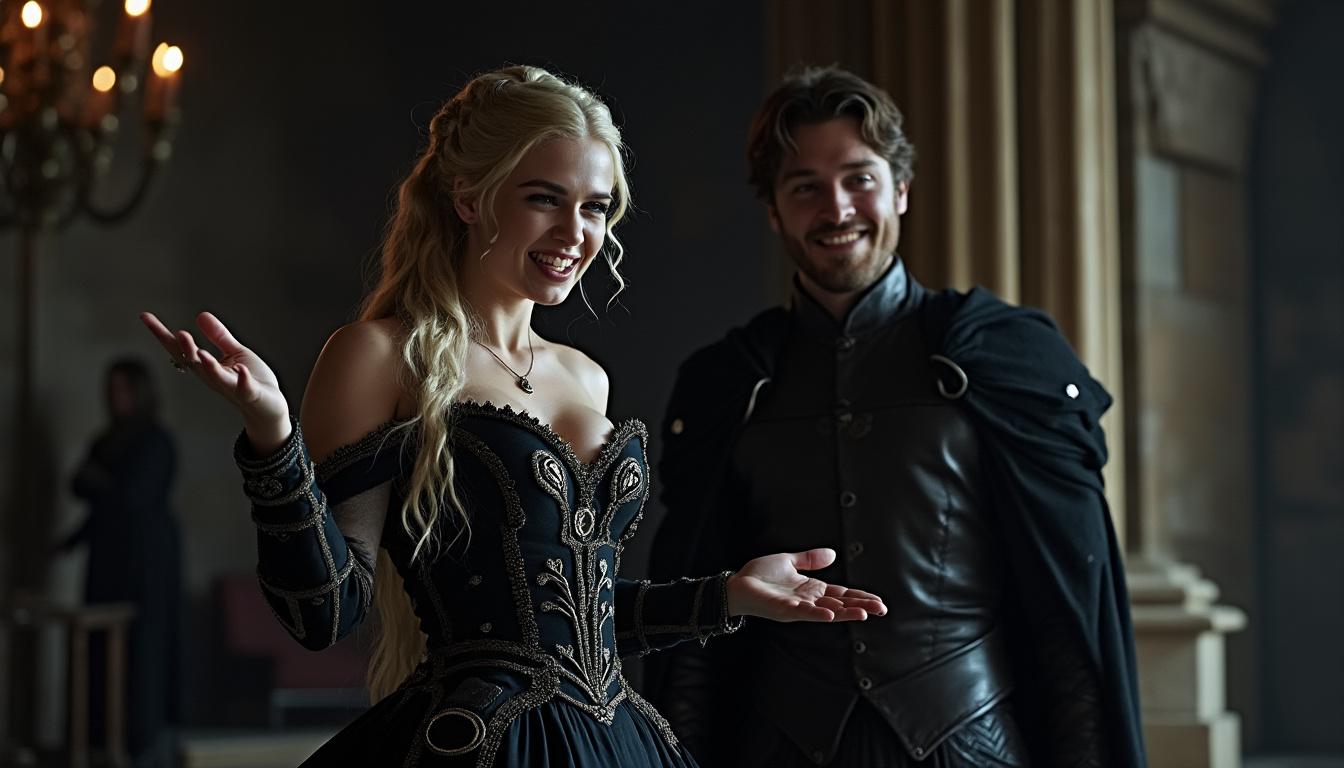Sophie Turner recently opened up about her experience filming a romantic scene with former co-star Kit Harington, describing kissing him as “vile.” This confession has sparked conversations among fans and industry professionals alike, especially considering the history they share from their time on the hit HBO series, Game of Thrones. The context behind their on-screen relationship in the forthcoming film, The Dreadful, adds a level of complexity to her provocative comment, providing a nuanced look into the challenges actors face when transitioning from one genre to another.
The Shift from Siblings to Lovers: A Complex Transition
In Game of Thrones, Sophie Turner played Sansa Stark, while Kit Harington portrayed Jon Snow, roles that established them as close relatives. This familial bond, although evolving into a deeper connection later in the series, created a unique dynamic that made the idea of a romantic relationship quite jarring for the actors. When they were later cast together as lovers in The Dreadful, the transition required a significant shift in their on-set mindset. Turner’s reaction to this peculiar circumstance highlights how professional boundaries can be blurred in Hollywood.
This casting choice is particularly interesting given that it was Turner herself who recommended Harrington for the role. Their pre-existing friendship and rapport made the decision seem natural, but the reality of filming love scenes brought its own challenges.
The awkwardness of kissing someone who you’ve portrayed as a brother for several seasons is not something many actors can easily navigate. Turner and Harrington both expressed their discomfort on set, emphasizing how odd it felt to switch from siblings in one series to romantic partners in another. Their emotional response reveals the complexities actors deal with, often balancing personal feelings and professional demands.

Why the Kiss Was Described as ‘Vile’
During her appearance on Late Night with Seth Meyers, Turner articulately conveyed her feelings on the situation. She stated, “We both were retching. It was vile.” This candid remark struck a chord with many viewers who appreciated her honesty in an industry often characterized by gloss and glamor. It was a moment of vulnerability that showcased the sheer awkwardness that can occur behind the camera, shattering the illusion of romance that fans often celebrate.
Harrington echoed similar sentiments, noting how their previous roles required them to maintain a sibling-like bond, making the romantic scenes feel forced and uncomfortable. The physical intimacy that the film required prompted genuine laughter and groans from both actors after they had completed filming.
This revelation resonates with various actors in Hollywood, especially those tasked with portraying characters that have a complicated history. Transitioning from one type of role to another can create notable tensions that aren’t always visible to the audience. Furthermore, it exposes the disconnected nature of acting; what may appear easy and romantic on-screen might involve real emotional and mental challenges behind the scenes. Below are some additional factors contributing to this discomfort:
- A history of character roles: Having portrayed siblings for multiple seasons creates an emotional anchor that is hard to detach from quickly.
- Audience perception: The audience’s established perception of their characters complicates how actors approach their new roles.
- Acting techniques: Actors may require different techniques to portray intimacy without crossing comfort boundaries.
The Dreadful: Setting the Scene for a New Narrative
The Dreadful is set during the Wars of the Roses and marks a significant departure from the fantasy world of Game of Thrones. The film explores themes of societal constraints and personal redemption through the lens of horror—a genre Turner has not extensively delved into before. The character she plays lives on the fringes of society, and her encounter with Harrington’s character catapults her into a new world filled with unexpected challenges.
Within this context, Turner’s discomfort during the romantic scenes takes on even greater significance. It’s not just a transitional hiccup; it serves as a plot device underscoring the bizarre circumstances of their shared history. This invites questions about how past experiences can inform and complicate present relationships, both on-screen and off.
By delving into the psychological underpinnings of their characters, the audience is drawn into a narrative that is both thrilling and unsettling. The relationship between the characters can be read on multiple levels: as a romantic connection bound by their intertwined pasts, and as a story of struggle that reflects societal issues.
| Character | Portrayed by | Description |
|---|---|---|
| Sansa Stark | Sophie Turner | Initially portrayed as a naive daughter, she evolves into a wise leader. |
| Jon Snow | Kit Harington | A brave warrior with a mysterious heritage, ultimately revealing family ties. |
The Importance of Vulnerability in Acting
Turner’s candid remarks not only shine a light on her discomfort but also exemplify a broader theme—vulnerability in acting. Professional actors often portray characters under emotional duress, yet they don’t always share the challenges that come with it. This can include everything from confronting their past roles to navigating new narratives that redefine them.
In the case of The Dreadful, the shift from familial roles to romantic leads is a testament to the dynamism of their acting capabilities, even if it doesn’t come without challenges. Vulnerability, in this context, renders deeper performances and connects audiences to the emotional journey presented by the actors.
Reactions from Fans and the Media
As news of Turner’s comments spread across platforms like People Magazine and Entertainment Weekly, fan reactions varied widely—from those who empathized with her experience to others who expressed curiosity. Forums and social media platforms buzzed with discussions about how one’s on-screen relationship can affect performance in entirely new contexts.
Online platforms, including BuzzFeed and Vanity Fair, published articles that dissected Turner’s statements, suggesting it opened doors to crucial conversations about the mental and emotional toll actors experience in their careers. The intersection of personal comfort and professional expectation is particularly relevant in an age where mental health is becoming a more central topic of discussion in Hollywood.
Understanding the Role of Media in Shaping Narratives
Audiences are keen to connect with the individuals behind the characters they admire. The media plays a significant role in how these narratives are presented. Articles covering Turner’s journey not only humanize her as an actress but also provide insight into the pressures of living up to fame while constantly evolving as a performer.
Through this lens, it becomes evident that what transpires on-screen is often a composite of various off-screen factors: personal history, industry expectations, and the inherent need for actors to remain relatable. This invites a greater understanding of their craft and the demands it entails.
The Future of On-Screen Relationships
As Turner and Harington navigate their experiences in The Dreadful, it raises pertinent questions about the future of on-screen relationships across genres. The unique challenges faced by actors, particularly when transitioning between contrasting roles, will likely inform casting decisions and narrative structures moving forward.
Anticipation around The Dreadful is high, and audiences are curious about how the chemistry—or lack thereof—between Turner and Harington will manifest in this new context. It’s not just about romance but the portrayal of complex human relationships stemming from shared history. As the entertainment world evolves, future projects may begin prioritizing more nuanced depictions of such relationships, reflecting the intricacies of human connection.
Hollywood’s evolving landscape encourages actors to take risks and challenge norms, ultimately enriching storytelling. Sophisticated portrayals of relationships, especially those embedded in surprise and discomfort, will become essential in engaging audiences. The anticipation following Turner’s comments could pave the way for a more open dialogue regarding the emotional stakes of acting, which will benefit both artists and viewers alike.


